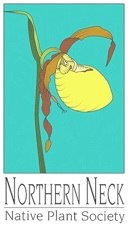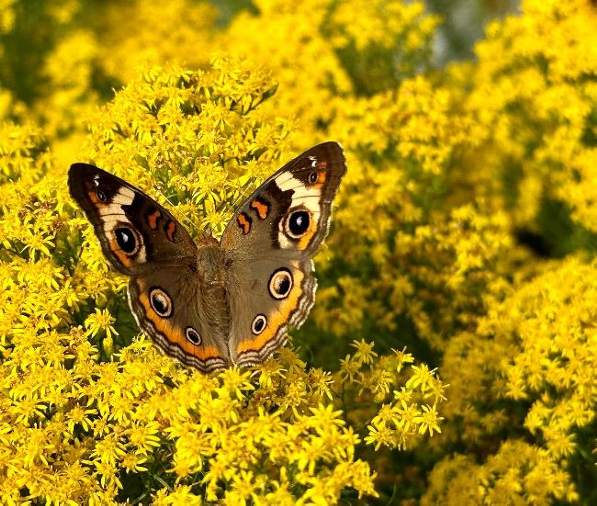Plant of the Month October 2023: Slender Flat-top Goldenrod
By Betsy Washington
Slender Flat-top Goldenrod, Euthamia caroliniana
Monarchs and Large Carpenter Bees love the fall nectar
Slender Flat-top Goldenrod is a beautiful deciduous, perennial closely related to goldenrods and is an underused but superior pollinator plant. Its nectar-rich flowers bloom over a long period from September into late fall, often lasting into November or even December. It is particularly important to our native bees and butterflies as it is one of the last nectar plants to bloom. The overall plant has a very fine texture with slender upright stems, with fine, soft linear grass-like leaves less than 1/8” wide and up to 21/2” long with a single vein down the center. The foliage is sweetly aromatic adding to its charm and leading to another common name, Slender, Fragrant Goldenrod. As summer progresses the slender stems branch towards the top and in September are topped with large flat-topped, billowy panicles of tiny yellow flowers creating quite a spectacle. This plant has amazing ecological value but unlike some goldenrod-relatives does not get too tall or overly aggressive. Growing only 2 – 3’ high and 2’ wide, it fits into most gardens, although it does spreads by root rhizomes and seeds to form large eye-catching clumps. When in bloom, Slender Flat-top creates a dramatic architectural presence in the garden with its clouds of flat-top flowerheads atop soft feathery stems and foliage. Stems are shallow-rooted and easy to pull up and share if they spread beyond their place.
Fragrant Slender Flat-top is native to eastern North America mostly in the coastal plain extending from Nova Scotia south to Florida leading to another common name, Coastal Slender Flat-top Goldenrod. In Virginia it is common throughout the Coastal Plain but is infrequent in the outer Piedmont. A few disjunct populations occur in Augusta County and in the central Ridge and Valley province. Slender Flat-top can be found naturally in dune grasslands, interdune swales, around ponds, bogs and depression ponds, and in fairly dry clearings and old fields. It is even at home in poor, sandy acidic soils in powerline cuts and along roadsides.
Clouds of flat-topped blooms top the feathery foliage
As you might guess from the diverse habitats it is found in, Slender Flat-top Goldenrod is quite adaptable and easy to grow in the garden. It is tolerant of most soils from sandy to clay but also can be found in acidic, poor soils. It thrives in full sun but tolerates part shade and moist to occasionally wet areas. It is drought tolerant once established.
Try this beautiful Goldenrod in butterfly and pollinator gardens where it is of particular importance to native bees and late season butterflies or in naturalized areas and meadows, upper shorelines, or along the edges of ponds or streams. As a bonus it also makes a wonderful cut flower.
Invite this beautiful and architectural native plant into your garden and prepare to enjoy the clouds of butterflies as well as native bees it will surely attract. Songbirds relish the seed which can be collected when the flowers turn to wispy white clouds, ready to be dispersed by the wind. Just leave plenty for the birds! And perhaps best of all, this under-appreciated goldenrod truly creates a long-lasting fall spectacle in the garden sure to win your heart.
Common Buckeye is one of the butterflies seeking nectar from Slender Flat-top
Red Admiral (right) is another butterfly seeking nectar from Slender Flat-top
Slender Flat-top Goldenrod (in foreground) lights up my pollinator gardens for weeks each fall





